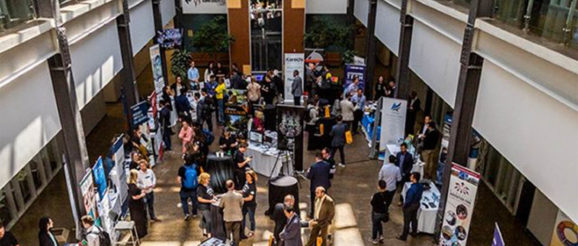McMaster Innovation Park: Changing Hamilton, then the world

While Hamilton is now well-established as a burgeoning hub for multiple industries from hospitality to arts & culture, it might not immediately be thought of as a heavyweight in the tech industry.
But thanks to the work being done at McMaster Innovation Park (MIP), Hamilton is rapidly on its way to becoming the region’s mini version of Silicon Valley.
An offshoot of McMaster University that officially opened its doors in 2009, McMaster Innovation Park isn’t simply a local incubator for research, experimentation, and entrepreneurship; it is also Canada’s premiere research centre for major innovations that are poised to have resounding impact within the life sciences, manufacturing, and tech industries (and, sometimes, a combination of all three) on a national and international level.
In speaking with Sarah Boggan, MIP’s Marketing and Public Relations Manager, it immediately becomes obvious that Innovation Park has very clear-eyed and ambitious goals for its future; with a particular focus on giving space and resources to timely innovations that are almost ready to take off.
“If someone is working on the next algorithm that will be implemented in 10 years from now, we don’t recommend you come to MIP; there are other places that would be more suitable for you,” Boggan explains. “If you’re trying to bring something to market in the next 18-24 months, then come see us. We’re focused on impacting people today.”
That approach, one with a keen awareness of the zeitgeist, has already resulted in a number of recent notable successes that McMaster Innovation Park has proudly played an active role in supporting.
One such success is going to see the final product taking root right here in the Hammer. Last spring, the work finally began on building Ressam Gardens, which will become North America’s first smart retirement home that supports senior residents with Alzheimer’s and dementia.
Set to be located on West 5th Street here in Hamilton, technology-integrated features of the facility will include furniture, lighting, flooring, and beyond — all of which are designed to ease and support the lives of those suffering from these debilitating diseases. Pre-construction, MIP is hosting a showroom built to showcase these invaluable new capabilities.
Innovations in the field of health and medicine hardly stop there. Fusion Pharmaceuticals, another MIP resident company which was founded by former McMaster University researcher John Valiant, recently received a $105 million investment towards their work on developing a new form of cancer treatment; the largest-ever Series B investment in a Canadian start-up, which is hardly surprising for a research
initiative that could literally change the world.
Another major project that melds both the health science and tech fields is Reliq Health, which uses an app-based technology to remotely monitor the health and wellness of underserved and high-risk individuals; an innovation with humble origins in The Forge, which is a smaller Hamilton-based research incubator with ties to McMaster. Today, Reliq Health is growing rapidly with international connections, climbing revenues, and notable contributions to the healthcare needs of Canada’s First Nations communities.
When I asked Boggan about where McMaster Innovation Park sees itself and its role in the near future, her response is an unreserved one signalling that MIP has no plans of slowing or scaling down. “Our goal is for this to evolve from innovation park, to innovation city, to innovation region, to innovation country.”
Clearly, McMaster Innovation Park’s ambitions are as limitless as the cutting-edge innovators they support.
